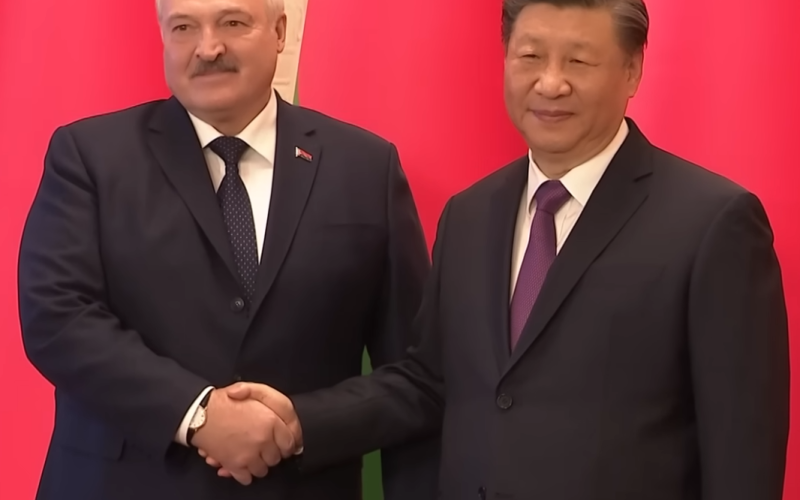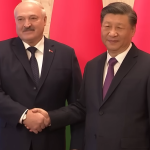Belarus has once again found itself at the center of global attention, not for its sporting stars like Aryna Sabalenka, but for its deepening political and military ties with China. President Alexander Lukashenko’s recent three-day visit to Beijing, which wrapped up on June 4, was anything but routine.
Unlike previous state visits, this one was billed as a “traditional friendly family meeting,” a format reserved for only the closest of allies. The Belarusian leader was greeted personally at the airport by China’s Minister of Science and Technology, Yin Hejun, and was honored with a military escort—a rare gesture that underscored the growing warmth between the two countries.
Delta Airlines Flights Chaos: 200 Passengers, 13 Hotel Rooms, and a Night in the Parking Lot
During his stay, Lukashenko and Chinese President Xi Jinping shared a family-style lunch and an informal agenda, but the symbolism was powerful. Xi praised Belarus as an “all-weather partner” and a “true friend,” inviting Lukashenko to attend the upcoming Shanghai Cooperation Organization (SCO) summit in Tianjin and a grand military parade in Beijing on September 3.
This parade will mark the 80th anniversary of the end of World War II and is expected to draw other world leaders, including Russia’s Vladimir Putin. The invitation signals Belarus’s rising status in China’s diplomatic orbit and its increasing importance as a bridge between East and West.
D-Day 2025: Are These the Last Heroes We’ll Ever See Return to Normandy?
The timing of this visit is no coincidence. Belarus, still reeling from Western sanctions imposed over its support for Russia in the Ukraine conflict, is seeking new economic and strategic lifelines. China, for its part, is eager to showcase its Belt and Road Initiative and expand its influence in Eurasia.
The two nations have already ramped up industrial cooperation, with Chinese technologies and Belarusian manufacturing capacity forming the backbone of new projects in mechanical engineering and transportation. Just last year, Chinese Premier Li Qiang visited Minsk to cement these ties, and high-level exchanges have become more frequent, reflecting a shared vision of mutual benefit without what both sides call “blackmail or ultimatums.”
Is Sahara AI’s #AIforALL Revolution Redefining the Future of AI?
The military dimension of this partnership is also on full display. On May 9, Minsk hosted a massive Victory Parade to commemorate the 80th anniversary of the end of the Great Patriotic War. The spectacle featured over 4,000 military personnel, 200 pieces of equipment, and nearly 40 aircraft and helicopters.
What made the event truly international was the participation of military units from China, Russia, and several Central Asian countries. The parade, attended by President Lukashenko and World War II veterans, was a vivid reminder of Belarus’s historical legacy and its ongoing quest for security and recognition on the world stage.
Deutsche Bank Raises GE Stock Target to $300 – Is This Aerospace Giant Ready for Takeoff?
Chinese troops have not only marched in Minsk but are also hosting Belarusian counterparts for joint training exercises ahead of the upcoming parade in Beijing. This growing military cooperation is a clear message to the West:
Belarus is not isolated, and its alliances are stronger than ever. The parade in Beijing is expected to be a showcase of unity, bringing together leaders and troops from across Eurasia in a highly choreographed display of power and solidarity.
Beyond the headlines, the Belarus-China relationship is also about trade. Belarus exports potassium fertilizers, meat, dairy products, and timber to China, while importing cars, electronics, and medical equipment.
Halle Berry Reveals Secret to Ageless Beauty: The $200 Neck Cream Everyone’s Talking About
The trade balance favors China, but Belarus’s strategic location and willingness to support China’s global initiatives have made it a key player in the region.
For President Lukashenko, who has ruled Belarus for over three decades and recently won another contested election, these international partnerships are vital.
They offer economic opportunities and political legitimacy at a time when relations with the West remain frosty. For China, Belarus is a reliable ally and a gateway to Europe, especially as the Belt and Road Initiative continues to expand.
Saint Meghan Markle or “Too Precious”? The Duchess Fires Back Amid Panel Drama and Pregnancy Rumors
As the world watches, Belarus is carving out a new role for itself, balancing its Soviet-era traditions with modern alliances. Whether this will bring long-term prosperity or new challenges remains to be seen, but one thing is certain: Belarus is no longer content to be a bystander in global affairs.
For those interested in the evolving dynamics of Eurasian security and diplomacy, the Shanghai Cooperation Organization and the Belt and Road Initiative offer deeper insights into Belarus’s future.





